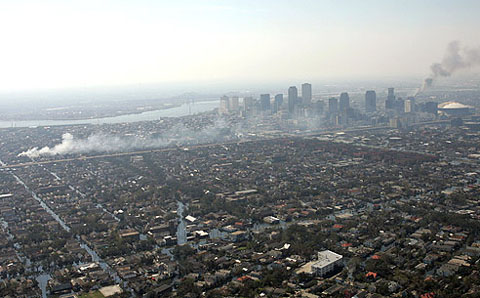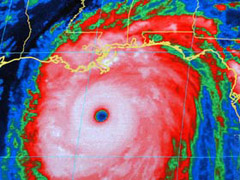SUBJECT: HURRICANE KATRINA
SOURCE: JUAN WILSON juanwilson@mac.com
POSTED: 6 September 2005 - 1:45pm
A Lesson from Katrina

aerial photo of a smoldering downtown New Orleans from www.CNN.com
America
in the Aftermath I've been
getting emails from good hearted people about the issue, but I
don't agree with proposals to petition the government to lower
or cap gas prices. This may sound bizarre, but I am not hoping
gas prices come down or have any artificial cap what so ever. |
SUBJECT: HURRICANE KATRINA
SOURCE: JUAN WILSON juanwilson@mac.com
New
Orleans in Peril As New Orleans is evacuated, with dire predictions of a million residents possibly caught without homes when the storm passes; as a new record of over $70 a barrel is set for oil in anticipation of the suspension oil drilling and oil refining in the Gulf of Mexico, I am amazed that two things have not been reported on CNN, Fox or MSNBC as they look for things to talk about in their 24/7 coverage of this biblical storm: 1) Global Warming 2) End of the Cheap Oil I know from relatives who live in Florida that there was much talk last year about global warming as the cause of the five hurricanes that blasted the state in a little over a month. Many residents talked about leaving the state. Little of this was reported in our national media. Global warming is largely produced by greenhouse gas emissions from the burning of gasoline. Katrina appears to be bearing down on the source of her creation as she takes aim at the Gulf Coast of the United States where 25% of US crude is pumped. New Orleans may sustain such damage that it will make little sense to invest the billions necessary to rebuild it. It is a city that should never have grown so large in so bad a location. About 70% of the city is below sea level and is sinking (due mostly to man-made effects on the environment). If the levees are topped by Katrina the city may be under water for a long time. I can only feel pity for those who did not have a gassed up car to escape Katrina. Several thousand are huddling now in Superdome. It was advertised as a refuge of last resort. People there would likely have to stay in the arena until Tuesday with no light, air-conditioning or perhaps even water. It was expected that flooding in the city would enter and flood the field of the Superdome thus leaving only the higher seats dry. The news coverage noted that no food or medical services were being provided at the Superdome, however there would be soldiers.The people I saw entering the stadium were overwhelmingly black with a scattering of street people. All were being checked by National Guard troops for implements of terrorism. An interview on CNN with two guardsmen revealed such confiscated items as an allen wrench, a fork, and a nail clip. Insanity rules. What a nightmare, and whose idea was it? |
SUBJECT: HURRICANE KATRINA
Gulf storm creates record oil price
SOURCE: FAITH HARDING
tophatandscarf@yahoo.com 28 August 2005 - 8:00pm
Already Reuters in Sidney Australia reported that... oil prices surged to a record above $70 a barrel on Monday as one of the biggest storms in the history churned through the Gulf of Mexico, forcing major oil producers and refiners to shut down operations. Prices leapt
as Hurricane Katrina, the 11th named storm of what is expected to
be an unusually severe season, threatened to do lasting damage to
vital U.S. oil and refining assets in the Gulf of Mexico, further
straining an industry that has struggled to keep up with two years
of strongly rising oil demand. |
Pau
